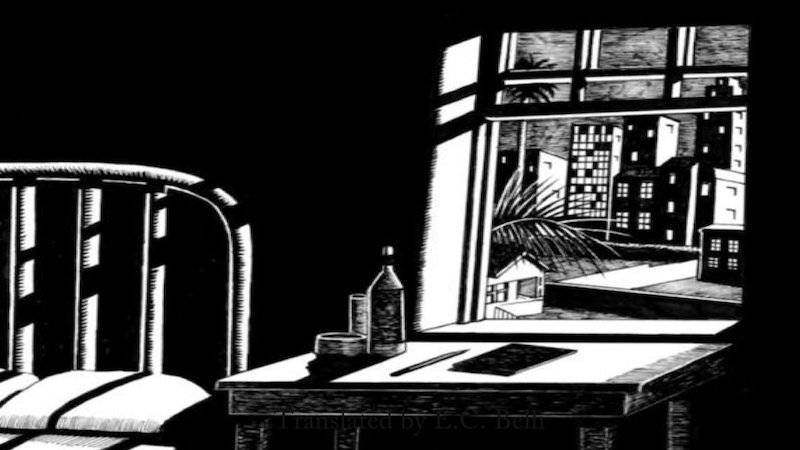Ashley C. Ford: If “Kids Are the Future,” Why Don’t We Act Like it?
In Conversation with Jordan Kisner on Thresholds
This is Thresholds, a series of conversations with writers about experiences that completely turned them upside down, disoriented them in their lives, changed them, and changed how and why they wanted to write. Hosted by Jordan Kisner, author of the essay collection Thin Places, and brought to you by Lit Hub Radio.
*
In this episode, Jordan talks with Ashley C. Ford, author of the memoir Somebody’s Daughter, about how writing made her into more of herself, about the systems we live under, and about finding joy in new community.
Subscribe and download the episode, wherever you get your podcasts!
*
Mentioned:
Dr. Jill Christman, professor at Ball State • Paying off lunch debts (check out All for Lunch!) • Onsite Workshops in Tennessee
*
From the episode:
Ashley C. Ford: I’m not just thinking about individuals, I’m thinking about systems—the systems we live in and the systems we live under. Right now, we’re working to end the federal free breakfast and lunch program for schools. Kids are being killed in their classrooms, beside their teachers. Not every kid gets the chance to go to a school that has resources, or in some cases even internet. There are places where kids have to go to school without internet in this country. There are kids who have never had a birthday party, and they are not Jehovah’s Witnesses. There are kids who basically spend their entire childhoods being told that despite having none of the creature comforts of the kids they see in movies, on TV, or sometimes just on the other side of town, that they should be imminently grateful. Just pure grateful for the fact that maybe they have a roof over their head and maybe they eat regular.
We talk about kids being the future. We talk about, “I want to do this for kids. I want to do that for kids.” That we’re making changes in this country for the betterment of kids and to protect the children because they’re so precious and they’re so important—and none of the things that actually affect their lives on a daily basis do we have any interest in addressing, even down to health care.
I’m a person who’s very opinionated and very, very on the internet. Anybody who is familiar with my book is probably also familiar with that. I have never received more online harassment in my entire life than when I raised money to pay off kids’ lunch debts across the country. That’s the most harassment I’ve ever received. Message after message, email after email. And they all basically say the same thing: If we feed the kids, we let their parents off the hook. And they’re not my responsibility, they’re their parents responsibility. And if we let their parents get away with not paying the school to feed their kid, then what kind of person is that kid going to grow up to be?
Jordan Kisner: Maybe I’m just a terrible cynic, but I had this feeling of, well, of course. Those people who enact those policies and the people who make those systems, they don’t have an expectation that those kids are going to be okay or that they should be okay. They just devalue them. How could they possibly uphold the fantasy that those kids are going to hit 18 and just be fine? Or good workers in the corporate system or whatever.
Ashley C. Ford: That’s the standard that they’re held to no matter what. In general, it doesn’t really matter. It’s just like, what standard are you actually being held to, and what do you lose in some cases along the way? As a kid who grew up in poverty with an incarcerated parent, I am just now learning how to want things again. Which sounds wild, right?
Jordan Kisner: No, that sounds like it makes sense.
Ashley C. Ford: Yeah. Because when you’re a kid who grows up in poverty, you think wanting things hurts people. Because you see your mom cry because she can’t get you something that you want. You see how other adults, when you say you want something, correct you and be like, don’t bring that up to your mom, she can’t afford that and you’re going to hurt her feelings, or you’re going to hurt your dad’s feelings, you’re going to hurt your grandma and grandpa’s feelings. You’re very much taught as a kid to have gratitude for the lack in your life.
And then you get older, and in some ways, it feels like a superpower because you feel so much more capable and like you can handle so much more than your peers who grew up with a little more padding and a little more care. But then you get to a place, if you’re lucky, where it can be different. And instead of running toward that different, you are stuck in place because you just never thought you’d even get the chance to choose it.
________________________________
For more Thresholds, visit us at thisisthresholds.com. Original music by Lora-Faye Åshuvud and art by Kirstin Huber.
Ashley C. Ford is a writer, host, and educator who lives in Indianapolis, Indiana with her husband, poet and fiction writer Kelly Stacy, and their chocolate lab, Astro Renegade Ford-Stacy. Ford is the former host of The Chronicles of Now podcast, co-host of the HBO companion podcast Lovecraft Country Radio, seasons one & three of MasterCard’s Fortune Favors the Bold, as well as the video interview series PROFILE by BuzzFeed News, and Brooklyn-based news & culture TV show 112BK. She was also the host of the first season of Audible’s literary interview series, Authorized. She has been named among Forbes Magazine‘s 30 Under 30 in Media (2017), Brooklyn Magazine‘s Brooklyn 100 (2016), Time Out New York’s New Yorkers of The Year (2017), and Variety’s New Power of New York (2019).




















